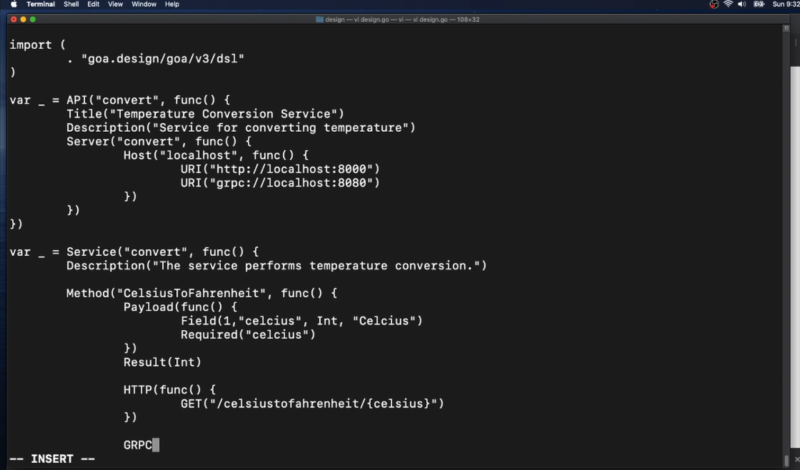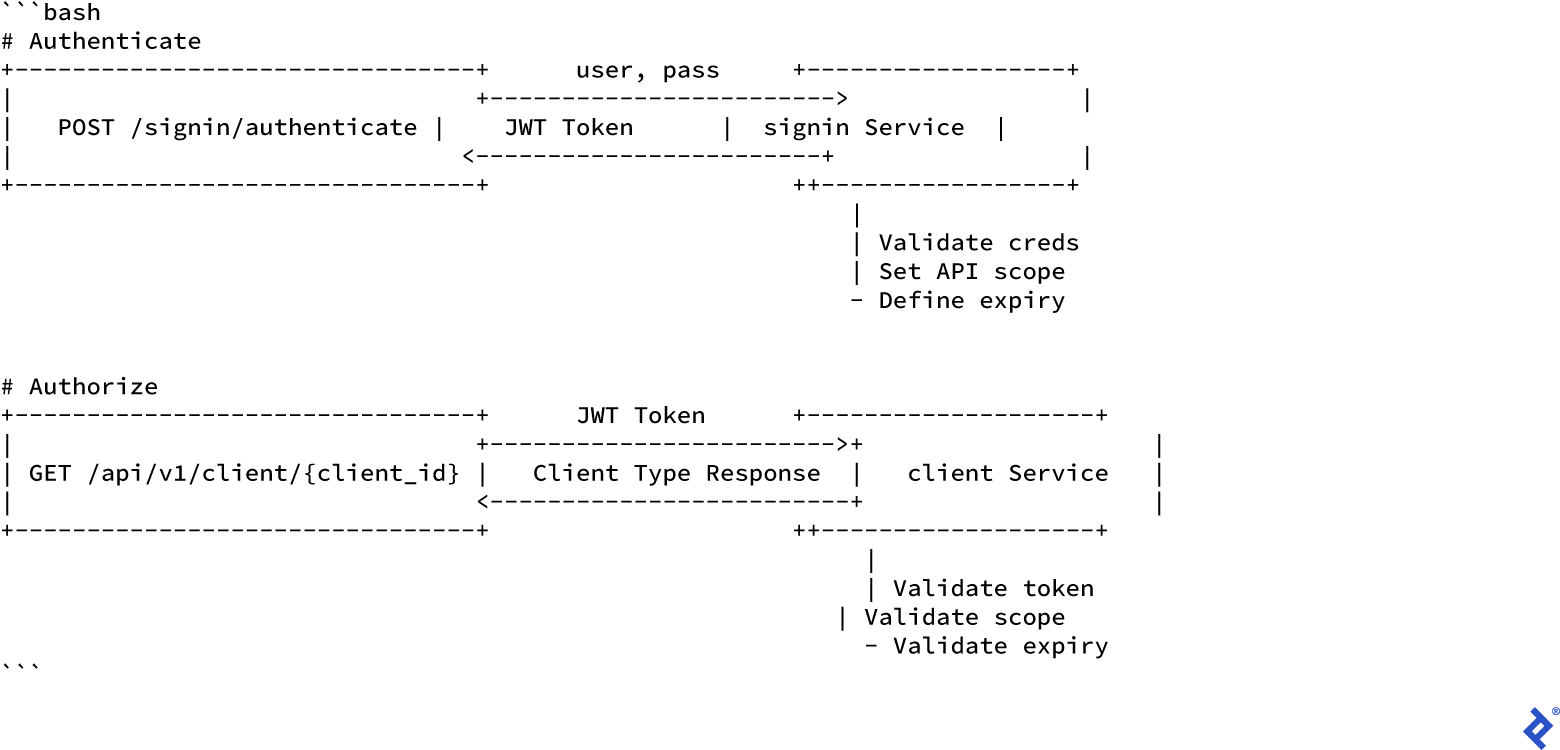Goa is a framework for building micro-services and APIs in Go using a unique design-first approach.
Overview
Goa takes a different approach to building services by making it possible to describe the design of the service API using a simple Go DSL. Goa uses the description to generate specialized service helper code, client code and documentation. Goa is extensible via plugins, for example the goakit plugin generates code that leverage the Go kit library.
The service design describes the transport independent layer of the services in the form of simple methods that accept a context and a payload and return a result and an error. The design also describes how the payloads, results and errors are serialized in the transport (HTTP or gRPC). For example a service method payload may be built from an HTTP request by extracting values from the request path, headers and body. This clean separation of layers makes it possible to expose the same service using multiple transports. It also promotes good design where the service business logic concerns are expressed and implemented separately from the transport logic.
The Goa DSL consists of Go functions so that it may be extended easily to avoid repetition and promote standards. The design code itself can easily be shared across multiple services by simply importing the corresponding Go package again promoting reuse and standardization across services.
Code Generation
The Goa tool accepts the Go design package import path as input and produces the interface as well as the glue that binds the service and client code with the underlying transport. The code is specific to the API so that for example there is no need to cast or "bind" any data structure prior to using the request payload or response result. The design may define validations in which case the generated code takes care of validating the incoming request payload prior to invoking the service method on the server, and validating the response prior to invoking the client code.
Getting Started Guides
A couple of Getting Started guides produced by the community.
Video
Joseph Ocol from Pelmorex Corp. goes through a complete example writing a server and client service using both HTTP and gRPC transports.
Blog
Gleidson Nascimento goes through how to create a complete service that using both CORS and JWT based authentication to secure access.
Installation
Assuming you have a working Go setup, and are using Go modules:
env GO111MODULE=on go get -u goa.design/goa/v3/...@v3
Alternatively, when NOT using Go modules (this installs Goa v2, see below):
env GO111MODULE=off go get -u goa.design/goa/...
Goa Versions and Go Module Support
Goa v2 and Goa v3 are functionally identical. The only addition in Goa v3 is support for Go modules. Goa v3 requires Go v1.11 or above, it also requires projects that use Goa to be within modules.
Projects that use Goa v3 use goa.design/goa/v3 as root package import path while projects that use v2 use goa.design/goa (projects that use v1 use github.com/goadesign/goa).
Note that the Goa v3 tool is backwards compatible and can generate code for v2 designs. This means that you don't need to swap the tool to generate code for designs using v2 or v3 (designs using v1 use a different tool altogether).
Vendoring
Since Goa generates and compiles code vendoring tools are not able to automatically identify all the dependencies. In particular the generator package is only used by the generated code. To alleviate this issue simply add goa.design/goa/codegen/generator as a required package to the vendor manifest. For example if you are using dep add the following line to Gopkg.toml:
required = ["goa.design/goa/codegen/generator"]
This only applies to Goa v2 as vendoring is not used together with Go modules.
Stable Versions
Goa follows Semantic Versioning which is a fancy way of saying it publishes releases with version numbers of the form vX.Y.Z and makes sure that your code can upgrade to new versions with the same X component without having to make changes.
Releases are tagged with the corresponding version number. There is also a branch for each major version (v1, v2 and v3).
Current Release: v3.2.6
Teaser
Note: the instructions below assume Goa v3.
1. Design
Create a new Goa project:
mkdir -p calcsvc/design
cd calcsvc
go mod init calcsvc
Create the file design.go in the design directory with the following content:
package design
import . "goa.design/goa/v3/dsl"
// API describes the global properties of the API server.
var _ = API("calc", func() {
Title("Calculator Service")
Description("HTTP service for adding numbers, a goa teaser")
Server("calc", func() {
Host("localhost", func() { URI("http://localhost:8088") })
})
})
// Service describes a service
var _ = Service("calc", func() {
Description("The calc service performs operations on numbers")
// Method describes a service method (endpoint)
Method("add", func() {
// Payload describes the method payload
// Here the payload is an object that consists of two fields
Payload(func() {
// Attribute describes an object field
Attribute("a", Int, "Left operand")
Attribute("b", Int, "Right operand")
// Both attributes must be provided when invoking "add"
Required("a", "b")
})
// Result describes the method result
// Here the result is a simple integer value
Result(Int)
// HTTP describes the HTTP transport mapping
HTTP(func() {
// Requests to the service consist of HTTP GET requests
// The payload fields are encoded as path parameters
GET("/add/{a}/{b}")
// Responses use a "200 OK" HTTP status
// The result is encoded in the response body
Response(StatusOK)
})
})
})
This file contains the design for a calc service which accepts HTTP GET requests to /add/{a}/{b} where {a} and {b} are placeholders for integer values. The API returns the sum of a and b in the HTTP response body.
2. Implement
Now that the design is done, let's run goa on the design package. In the calcsvc directory run:
goa gen calcsvc/design
This produces a gen directory with the following directory structure:
gen
├── calc
│ ├── client.go
│ ├── endpoints.go
│ └── service.go
└── http
├── calc
│ ├── client
│ │ ├── cli.go
│ │ ├── client.go
│ │ ├── encode_decode.go
│ │ ├── paths.go
│ │ └── types.go
│ └── server
│ ├── encode_decode.go
│ ├── paths.go
│ ├── server.go
│ └── types.go
├── cli
│ └── calc
│ └── cli.go
├── openapi.json
└── openapi.yaml
7 directories, 15 files
calccontains the service endpoints and interface as well as a service client.httpcontains the HTTP transport layer. This layer maps the service endpoints to HTTP handlers server side and HTTP client methods client side. Thehttpdirectory also contains a complete OpenAPI 2.0 spec for the service.
The goa tool can also generate example implementations for both the service and client. These examples provide a good starting point:
goa example calcsvc/design
calc.go
cmd/calc-cli/http.go
cmd/calc-cli/main.go
cmd/calc/http.go
cmd/calc/main.go
The tool generated the main functions for two commands: one that runs the server and one the client. The tool also generated a dummy service implementation that prints a log message. Again note that the example command is intended to generate just that: an example, in particular it is not intended to be re-run each time the design changes (as opposed to the gen command which should be re-run each time the design changes).
Let's implement our service by providing a proper implementation for the add method. Goa generated a payload struct for the add method that contains both fields. Goa also generated the transport layer that takes care of decoding the request so all we have to do is to perform the actual sum. Edit the file calc.go and change the code of the add function as follows:
// Add returns the sum of attributes a and b of p.
func (s *calcsrvc) Add(ctx context.Context, p *calc.AddPayload) (res int, err error) {
return p.A + p.B, nil
}
That's it! we have now a full-fledged HTTP service with a corresponding OpenAPI specification and a client tool.
3. Run
Now let's compile and run the service:
cd cmd/calc
go build
./calc
[calcapi] 16:10:47 HTTP "Add" mounted on GET /add/{a}/{b}
[calcapi] 16:10:47 HTTP server listening on "localhost:8088"
Open a new console and compile the generated CLI tool:
cd calcsvc/cmd/calc-cli
go build
and run it:
./calc-cli calc add -a 1 -b 2
3
The tool includes contextual help:
./calc-cli --help
Help is also available on each command:
./calc-cli calc add --help
Now let's see how robust our code is and try to use non integer values:
./calc-cli calc add -a 1 -b foo
invalid value for b, must be INT
run './calccli --help' for detailed usage.
The generated code validates the command line arguments against the types defined in the design. The server also validates the types when decoding incoming requests so that your code only has to deal with the business logic.
4. Document
The http directory contains the OpenAPI 2.0 specification in both YAML and JSON format.
The specification can easily be served from the service itself using a file server. The Files DSL function makes it possible to server static file. Edit the file design/design.go and add:
var _ = Service("openapi", func() {
// Serve the file with relative path ../../gen/http/openapi.json for
// requests sent to /swagger.json.
Files("/swagger.json", "../../gen/http/openapi.json")
})
Re-run goa gen calcsvc/design and note the new directory gen/openapi and gen/http/openapi which contain the implementation for a HTTP handler that serves the openapi.json file.
All we need to do is mount the handler on the service mux. Add the corresponding import statement to cmd/calc/http.go:
import openapisvr "calcsvc/gen/http/openapi/server"
and mount the handler by adding the following line in the same file and after the mux creation (e.g. one the line after the // Configure the mux. comment):
openapisvr.Mount(mux)
That's it! we now have a self-documenting service. Stop the running service with CTRL-C. Rebuild and re-run it then make requests to the newly added /swagger.json endpoint:
^C[calcapi] 16:17:37 exiting (interrupt)
[calcapi] 16:17:37 shutting down HTTP server at "localhost:8088"
[calcapi] 16:17:37 exited
go build
./calc
In a different console:
curl localhost:8088/swagger.json
{"swagger":"2.0","info":{"title":"Calculator Service","description":...
Resources
Consult the following resources to learn more about Goa.
Docs
See the goa.design website.
Examples
The examples directory contains simple examples illustrating basic concepts.
Contributing
See CONTRIBUTING.






 The generated yaml does not use the OpenAPI oneOf keyword.
The generated yaml does not use the OpenAPI oneOf keyword.





